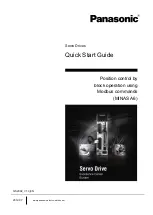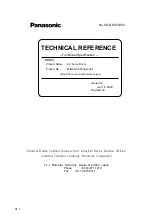
DM542E Digital Stepper Drive User Manual
Page | 11
12. Troubleshooting
In the event that your drive doesn’t operate properly, the first step is to identify whether the problem is electrical or
mechanical in nature. The next step is to isolate the system component that is causing the problem. As part of this
process you may have to disconnect the individual components that make up your system and verify that they operate
independently. It is important to document each step in the troubleshooting process. You may need this documentation
to refer back to at a later date, and these details will greatly assist our Technical Support staff in determining the
problem should you need assistance.
Many of the problems that affect motion control systems can be traced to electrical noise, controller software errors, or
mistake in wiring.
Problem Symptoms and Possible Causes
Symptoms
Possible Problems
Motor is not rotating
No power
Microstep resolution setting is wrong
DIP switch current setting is wrong
Fault condition exists
The drive is disabled
Motor rotates in the wrong direction
Motor phases may be connected in reverse
The drive in fault
DIP switch current setting is wrong
Something wrong with motor coil
Erratic motor motion
Control signal is too weak
Control signal is interfered
Wrong motor connection
Something wrong with motor coil
Current setting is too small, losing steps
Motor stalls during acceleration
Current setting is too small
Motor is undersized for the application
Acceleration is set too high
Power supply voltage too low
Excessive motor and drive heating
Inadequate heat sinking / cooling
Automatic current reduction function not being utilized
Current is set too high

































